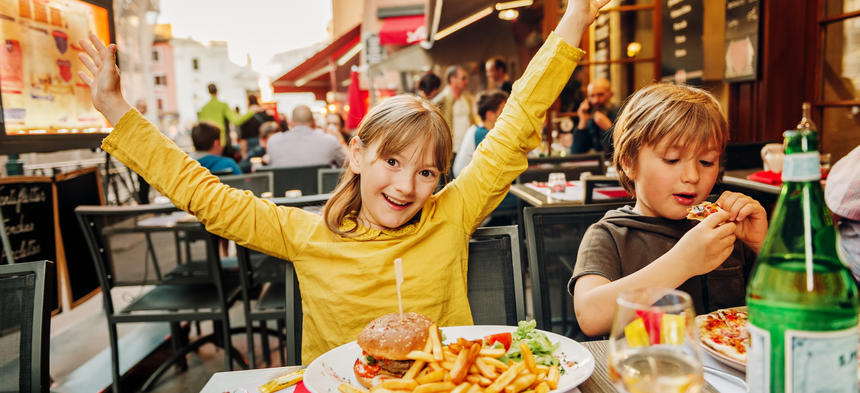Navigating Food Allergies: Anxiety and Avoidance After the End of COVID Restrictions
Some families and individuals with food allergies are having trouble re-engaging in social activities after COVID restrictions have been lifted. This is why.

Guest post by Paige Freeman, PhD

Paige L. Freeman, PhD, is a psychologist and frequent FARE contributor who has navigated her child's food allergy for the last 14 years. She provides telehealth services in 29 states to support others managing food allergies. To learn more, visit paigefreemanphd.com. You can also follow Dr. Freeman on Facebook, Instagram and Twitter.
Are you having a hard time post-COVID restrictions getting back out in the world and doing what matters to you? Is your food allergy anxiety preventing you or your family from participating in activities that your allergist has deemed low risk?
You aren’t alone.
I talk with a lot of individuals and families living with food allergy who are avoiding experiences they want to have because of their fear of having an allergic reaction, even though opting out of these experiences has been determined to be medically unnecessary by their allergist. For a lot of people this fear has been exacerbated as COVID restrictions are lifted and they are expected to re-engage in social activities that were paused during COVID. They describe being frustrated with their avoidance of life-enhancing activities and their level of fear surrounding the possibility of having (or their child having) an anaphylactic reaction. Sometimes the fear surrounds activities they took part in before COVID, and other times they are experiencing anxiety in anticipation of doing new things.
Some families and individuals have found it hard to re-engage with what they were doing pre-COVID because of the lack of recent experience and exposure to previously enjoyable activities. For other families, COVID restrictions interrupted their ability to successfully navigate new anxiety-provoking situations that were developmentally appropriate for their child’s age. In many parts of the U.S., COVID restrictions spanned two years or more, which means that children and families may never have experienced important psychosocial/developmental tasks related to food allergy.
Despite your psychological discomfort, it’s important to engage in your Allergist-Approved Low-Risk Activities (AALRAs). AALRAs are activities that your (or your child’s) allergist has deemed to be low risk and has approved for your participation. Any necessary precautions have been discussed beforehand. Engaging in these approved activities increases feelings of competence, contributes to a rich and meaningful life by doing what’s important to you, and if you are a parent, exposes your children to food allergy situations they will ultimately need to learn to navigate on their own.
Self-Efficacy
When faced with new challenges or navigating already established ones, developing self-efficacy is important. Self-efficacy refers to a person’s confidence in their ability to do something, such as completing a task, achieving a goal, or navigating a social situation.
One of the main factors that helps a person to develop self-efficacy surrounding a task is their evaluation of their success with past experiences involving a similar task. If you have already been successful at something similar, you are likely to believe you can be successful again, which leads to decreased anxiety surrounding the task. In food allergy terms, when you avoid AALRAs, you do not give yourself the opportunity to be successful, so you’re unable to build up your sense of self-efficacy surrounding your ability to manage food allergy in social situations. In many cases COVID restrictions and safety measures did not allow food allergy families the developmental experience of successful food allergy navigation, and this resulted in some families having low self-efficacy regarding the navigation of social situations. This lack of experience has led some food allergy families to avoid new stressful social situations because of fear. For some adults with food allergy anxiety, being unable to frequently repeat anxiety-provoking tasks during COVID restrictions has also led to low self-efficacy and avoidance.
Avoidance Increases Anxiety
Having low levels of self-efficacy and high levels of fear surrounding a certain task can lead to task avoidance. This can prevent someone from accumulating positive experiences that build confidence and can also lead them to over-predict negative outcomes. Remember that confidence is built through successful navigation of similar tasks.
When you avoid anxiety by reducing AALRAs you will likely feel an initial sense of relief that the uncomfortable situation has been avoided. But while the initial decline in anxiety feels great, it actually contributes to long-term increased anxiety, rumination, loss of confidence and worry. The main reason for this is that you start to attribute your (or your child’s) safety to avoidance and do not give yourself the chance to disconfirm your catastrophic predictions. This can lead to an avoidance of even more situations because you are decreasing your tolerance for discomfort, risk and adversity. This is how our world gets smaller.
How to Develop a New Relationship With Your Anxiety
- Make a plan. Most importantly, with the help of your allergist determine low-risk activities (AALRAs). Be clear on the recommended precautions in these situations and implement them. Make a list of anxiety-provoking, low-risk situations. Then, start with the situation that is the least anxiety-provoking for you, and do it. If you need to start with a very small step, that is still one step closer to living the life you want. While you are engaging in the activity, remember to remind yourself of why you are willing to experience this discomfort. What are the things that are important to you? Some of the things people find important include socializing, resilience, bravery, connection with other people, fostering peer relationships and, if you are a parent, having your child engage in typical developmental experiences. It is important to keep pushing through and continue to repeat items on the list that you have already accomplished.
- Redefine success. Remember how an evaluation of past successes is important for building self-efficacy? How do you evaluate or determine if an anxiety-inducing outing is successful? Most individuals and families living with food allergy who are experiencing anticipatory anxiety surrounding social situations would describe a successful outing as one that did not involve an allergic reaction. But there are other important definitions of success that may be overlooked. Success can look like having a realization that there are some holes in your planning and then re-evaluating and adjusting the plan. Success may be getting out and doing the activity in the face of your anxiety, even if it is extraordinarily difficult. Success can include your child watching you navigate discussions with others surrounding their allergy precautions. Success may even include having a reaction, carrying out your allergy plan, and developing feelings of competency as a result. Think about your own alternate definitions of success. When we focus on the only success possible being the absence of an allergic reaction, we set ourselves up for feelings of failure and guilt and increased anticipatory anxiety. Gathering new information, evaluating it, and integrating this new knowledge into your planning for future events is also important, and one of the only ways to do that is through experience. The willingness to be flexible, adjust to different experiences and developmental stages, and enjoy life despite our fear are all successes.
- Remember the goal. Remember that the goal is not an absence of anxiety but a decrease in medically unnecessary avoidance and an increase in activities that contribute to a rich and meaningful life. It is possible to engage in an activity while experiencing anxiety, even though our anxiety would like us to believe differently.
Our brains have the ability to change and adapt as the result of experience and practice. As you open your world to more opportunities, your mind will start to assess risk more accurately based on real-world experience and information. You will also start building resilience and cognitive flexibility through your willingness to be uncomfortable in the service of what you value.
If You Need Help Getting Unstuck
If you are having trouble taking the first step or get stuck in your progression, it may be time to talk to a mental health professional who has a clinical focus on food allergy anxiety. It is important that you seek treatment with an allergy-informed therapist. We understand the seriousness of food allergies and the unique stressors associated with food allergy management. We are well versed in effective strategies to help you manage your anxiety. To find a food allergy therapist in your area please visit the Food Allergy Counselor Directory.
While FARE does not endorse products, we support and appreciate enterprises and organizations that are committed to serving the food allergy community.


